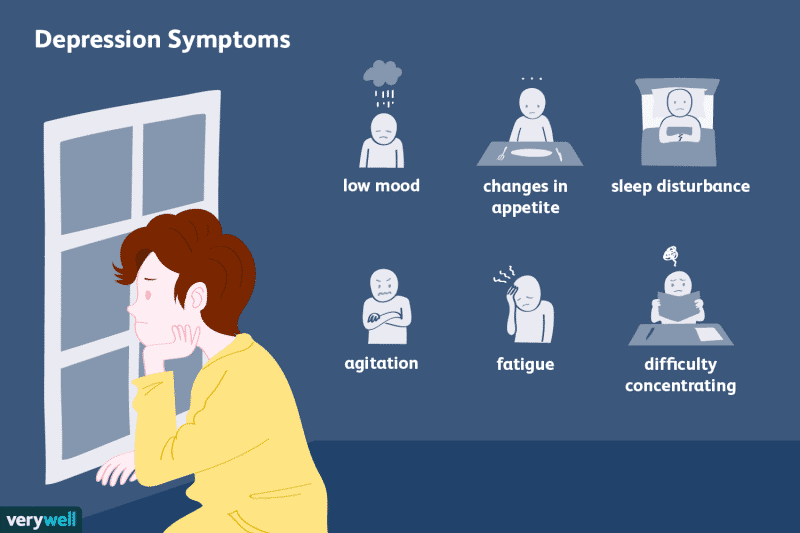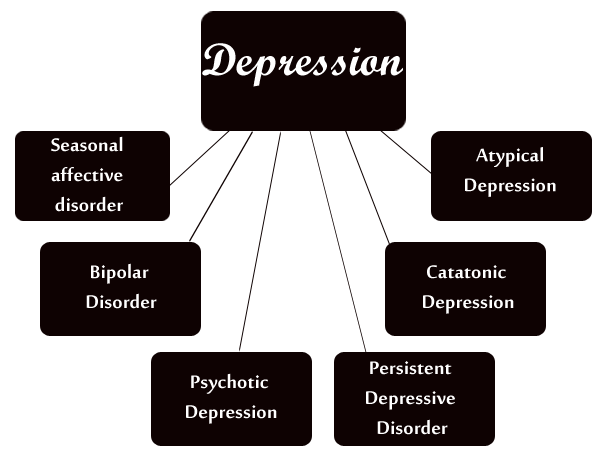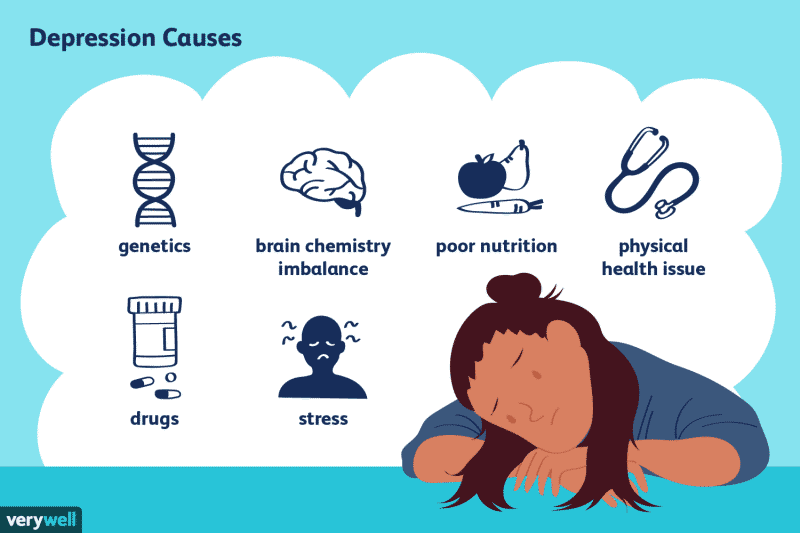This discussion includes the following information related to Depression:
- Depression
- Signs and Symptoms of Depression
- Types of Depression
- Causes of Depression
- Risk Factors for Depression
- Complications of Depression
- Tests and Diagnosis for Depression
- Treatment and Drugs for Depression
Depression Definition

Depression is a mood disorder that causes a persistent feeling of sadness and loss of interest. Also called major depression, major depressive disorder or clinical depression, it affects how you feel, think and behave and can lead to a variety of emotional and physical problems. You may have trouble doing normal day-to-day activities, and depression may make you feel as if life isn’t worth living.
More than just a bout of the blues, depression isn’t a weakness, nor is it something that you can simply “snap out” of. Depression may require long-term treatment. But don’t get discouraged. Most people with depression feel better with medication, psychological counseling or both. Other treatments also may help.
Signs and Symptoms of Depression

Although depression may occur only one time during your life, usually people have multiple episodes of depression. During these episodes, symptoms occur most of the day, nearly every day and may include:
- Feelings of sadness, emptiness or unhappiness
- Angry outbursts, irritability or frustration, even over small matters
- Loss of interest or pleasure in normal activities, such as sex
- Sleep disturbances, including insomnia or sleeping too much
- Tiredness and lack of energy, so that even small tasks take extra effort
- Changes in appetite — often reduced appetite and weight loss, but increased cravings for food and weight gain in some people
- Anxiety, agitation or restlessness — for example, excessive worrying, pacing, hand-wringing or an inability to sit still
- Slowed thinking, speaking or body movements
- Feelings of worthlessness or guilt, fixating on past failures or blaming yourself for things that are not your responsibility
- Trouble thinking, concentrating, making decisions and remembering things
- Frequent thoughts of death, suicidal thoughts, suicide attempts or suicide
- Unexplained physical problems, such as back pain or headaches
For some people, depression symptoms are so severe that it’s obvious something isn’t right. Other people feel generally miserable or unhappy without really knowing why.
EMERGENCY CASES If you feel depressed, make an appointment to see your doctor as soon as you can. Depression often gets worse if it isn’t treated. Untreated depression can lead to other mental and physical health problems or troubles in other areas of your life. Feelings of depression can also lead to suicide. If you’re reluctant to seek treatment, talk to a friend or loved one, a health care professional, a faith leader, or someone else you trust. If you have suicidal thoughts If you or someone you know is having suicidal thoughts, get help right away. Here are some steps you can take: When to get emergency help If you think you may hurt yourself or attempt suicide, call 911 or your local emergency number immediately. If you have a loved one who is in danger of committing suicide or has made a suicide attempt, make sure someone stays with that person. Call 911 or your local emergency number immediately. Or, if you think you can do so safely, take the person to the nearest hospital emergency room.
Types of Depression

Depression affects each person in different ways, so symptoms caused by depression vary from person to person. To clarify the type of depression you have, your doctor may add information to your depression diagnosis called a specifier. Specifiers include having depression with specific features, such as:
- Anxious distress — unusual restlessness or worry about possible events or loss of control
- Mixed features — simultaneous depression and mania, which includes elevated self-esteem, talking too much, and racing thoughts and ideas
- Melancholic features — severe depression with a profound lack of response to something that used to bring pleasure, associated with early morning awakening, worsened mood in the morning, significant changes in appetite, and feelings of guilt, agitation or sluggishness
- Atypical features — ability to be cheered by happy events, increased appetite, little need for sleep, sensitivity to rejection, and a heavy feeling in arms or legs
- Psychotic features — depression accompanied by delusions or hallucinations, which may involve themes of personal inadequacy or negative themes
- Catatonia — includes motor activity that involves either uncontrollable and purposeless movement or fixed and inflexible posture
- Peripartum onset — occurs during pregnancy or in the weeks or months after delivery (postpartum)
- Seasonal pattern — related to changes in seasons and diminished exposure to sunlight
Depression symptoms in children and teens
Common symptoms of depression in children and teens are similar to those of adults, but there can be some differences.
In younger children, symptoms of depression may include sadness, irritability, clinginess, worry, aches and pains, refusing to go to school, or being underweight.
In teens, symptoms may include sadness, irritability, feeling negative and worthless, anger, poor performance or poor attendance at school, feeling misunderstood and extremely sensitive, using drugs or alcohol, eating or sleeping too much, self-harm, loss of interest in normal activities, and avoidance of social interaction.
Depression may occur with other mental health conditions, such as anxiety, eating disorders, substance abuse or attention-deficit/hyperactivity disorder (ADHD).
Depression symptoms in older adults
Depression is not a normal part of growing older and it should never be taken lightly. Unfortunately, depression often goes undiagnosed and untreated in older adults, and they may feel reluctant to seek help. Symptoms of depression may be different or less obvious in older adults, including:
- Memory difficulties or personality changes
- Fatigue, loss of appetite, sleep problems, aches or loss of interest in sex, which are not caused by a medical condition or medication
- Often wanting to stay at home, rather than going out to socialize or doing new things
- Suicidal thinking or feelings, especially in older men
Causes of Depression

It’s not known exactly what causes depression. As with many mental disorders, a variety of factors may be involved, such as:
- Biological differences: People with depression appear to have physical changes in their brains. The significance of these changes is still uncertain, but may eventually help pinpoint causes.
- Brain chemistry: Neurotransmitters are naturally occurring brain chemicals that likely play a role in depression. When these chemicals are out of balance, it may be associated with depressive symptoms.
- Hormones: Changes in the body’s balance of hormones may be involved in causing or triggering depression. Hormone changes can result from thyroid problems, menopause or a number of other conditions.
- Inherited traits: Depression is more common in people whose biological (blood) relatives also have this condition. Researchers are trying to find genes that may be involved in causing depression.
- Life events: Traumatic events such as the death or loss of a loved one, financial problems, high stress, or childhood trauma can trigger depression in some people.


